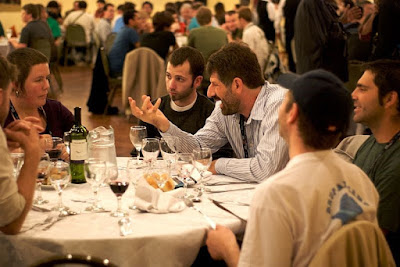So after a couple months of experiencing the life of being a science policy advisor at the Royal Society, on my RCUK policy internship, I thought it was time to update you on what I’ve thinking about as I come to the end of my internship.
Getting the right people involved…
An essential start to policy advice is to gain a grounding in the areas you are working in, without this, advice would be uninformed, unrepresentative and simply wasting time. So in huge areas such as climate science, the environment and energy, how do you find the right research, how do you find the right people to talk to?
Imagine a stadium full of people at the start of a football match. You need to walk in and find out who is thinking what. Where do you start?
Literature streams
If every one of those people is a research article, it will be impossible to look at all of them. Start with groups and target particular areas that may be relevant, beginning with more general reading but deepen as time allows. None of this should be new to anybody, but it is important to realise that there will be literature you will not be able to find, those people not on the stands in the stadium, but in the tunnels surrounding it. For this reason, and that peoples’ views and research perspectives change with time, like a crowd throughout the game, it is worth following literature streams as much as possible.
Consultations
Consultations can take a variety of forms (email, online survey, postal, formal interview, informal meeting), and the form needs to match the type or group of people you are trying to consult. Don’t try to consult rural areas if rural broadband is problematic for example. But consultations can be so useful for getting current information on research areas and other pieces of work that might be on-going or planned for the future. Often, many of us can be guilty of staying within our known networks, contacts and work areas, but by consulting widely and being aware of those silos is important to get a better understanding of how interconnected problems fit together.
 |
| Image credit: Wikimania2009 Beatrice Murch [CC BY 2.0 (http://creativecommons.org/licenses/by/2.0) or CC BY 3.0 (http://creativecommons.org/licenses/by/3.0)], via Wikimedia Commons |
Trends
Amongst all of this, it is always worth taking time out of intense research to think about trends. The timing of policy advice is essential and trends make up a significant part of seeing where opportunities are. It is almost impossible to gain all information one needs from quantitative consultations.
Invaluable information can be gained from formal and informal interviews, good relationship building with the right mix of people, and an open and aware mindset.
It is interesting that often having the ‘right connections’ is seen as an unscientific, unrepresentative and privileged stance. Yet it may be that we sometimes forget how important maintaining and building relationships are in postgraduate research. Post PhD, maintaining good relationships and building positive working environments are key factors for developing your own research projects, or for the wider work place in any and every field. So… take some time to think about who you are talking to, and who you should perhaps talk with next to develop ideas or make new links.
During the last month or so I have been exposed to many of these challenges at the Royal Society. I have found It surprising how many links there are to my own world under the canopy of a PhD and I am looking forward to taking some of those thoughts back with me. Tell you more next time…
(Views in this blog post are my own and do not represent those of the Royal Society.)
——————————
Other blogs in this series:

